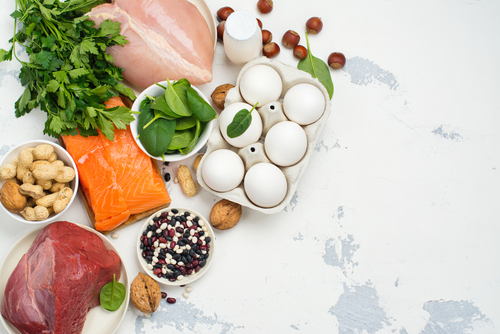Got Protein?
Protein seems to pop up in a number of online health articles these days. There’s talk about how important it is in the diet, how much you need in your diet and what form it should come in.
What Exactly is Protein?
Protein is an energy yielding nutrient which means it provides your body with fuel to function. It is classified as a macronutrient, which means that it is required in large amounts by the body. Protein is not stored within the body. There are literally “thousands of different proteins in the human body and in the diet.”
Protein is essential for building muscle in the body. According to Dr. Josh Axe “protein is not only important for building lean muscle tissue, it’s also critical for organ function. In fact, a lot of your organs, cells and tissues require protein for proper regeneration”. According to Web MD “your hair and nails are mostly made of protein. Your body uses protein to build and repair tissues. You also use protein to make enzymes, hormones, and other body chemicals. Protein is an important building block of bones, muscles, cartilage, skin, and blood”.
According to Live Science “protein is composed of amino acids, which are organic compounds made of carbon, hydrogen, nitrogen, oxygen or sulfur. Amino acids are the building blocks of proteins, and proteins are the building blocks of muscle mass”.
There are 20 different amino acids that can form a complete protein, nine of which the body cannot produce on its own. Amino acids that can be made by the body are called nonessential amino acids. Amino acids that cannot be made by the body and must be obtained in the diet through food or supplementation are called essential amino acids. Essential amino acids do not need to be consumed within the same meal but should typically be consumed within the same day. There is however emerging research that suggests this may not necessarily be the case.
Where Does Protein Come From?
Protein can be found in a number of foods including meat, poultry, dairy, seafood, eggs, nuts and seeds. There are also a number of plant based sources of protein including lentils, beans, peas, hemp, soy, quinoa, rice and buckwheat.
How Much Protein Do I Need in My Diet?
In his book, Staying Healthy with Nutrition: The Complete Guide to Diet and Nutritional Medicine, Dr. Elson M. Haas recommends the following protein requirements based on the various life stage programs.
| Life Stage Program | Grams of Protein Required Daily |
| Infant: Birth – 6 months | 2.2 g/kg |
| Infant: 7 months – 1 year | 1.6g/kg |
| Toddler 1 – 3years | 1.2g/kg |
| Child: 4 – 8 years | 30 – 35 g |
| Child 9 – 13 years | 35- 45 g |
| Adolescent boys 13 – 18 years | 56 g |
| Adolescent girls 13 – 18 years | 46 g |
| Adult Men | 50 – 75 g |
| Adult Women | 45 – 65 g |
| Pregnancy | 75 – 90 g |
| Lactation | 65 – 90 g |
| Menopause and Bone Health | 45 – 80 g |
| The Later Years (65, 70, and older) | 60 – 80 g |
What are the Benefits of Getting the Right Amount of Protein in My Diet?
According to Dr. Josh Axe getting the right amount of protein in your diet provides the following benefits:
- Boost Muscle Mass
- Help Manage Your Weight by Filling You Up
- Stabilize Blood Sugar Levels
- Improve Your Mood
- Promote Healthy Brain Function and Learning
- Help Maintain Strong Bones
- Protect Heart Health
- Slow Aging and Promote Longevity
While protein is an important component of your diet it doesn’t need to come from just one source. So, if you don’t care whether you’ve “got milk ®” or if you really don’t want to answer someone when they ask you “where’s the beef? ®” that’s totally ok because you can always get your daily dose of protein from other sources.
References
Smolin, Lori A., Grosvenor, Mary B., Gurfinkel, Debbie (2015). Nutrition: Science and Applications- Second Canadian Edition. New York. John Wiley and Sons Canada, LTD.
https://draxe.com/how-many-grams-of-protein-per-day/
https://www.webmd.com/men/features/benefits-protein#1
https://www.livescience.com/53044-protein.html
https://draxe.com/protein-foods/
Haas, Dr. Elson M. (2006). Staying Healthy with Nutrition- The complete guide to diet and nutritional medicine. New York. Ten Speed Press an imprint of the Crown Publishing Group, a division of Random House, Inc.


